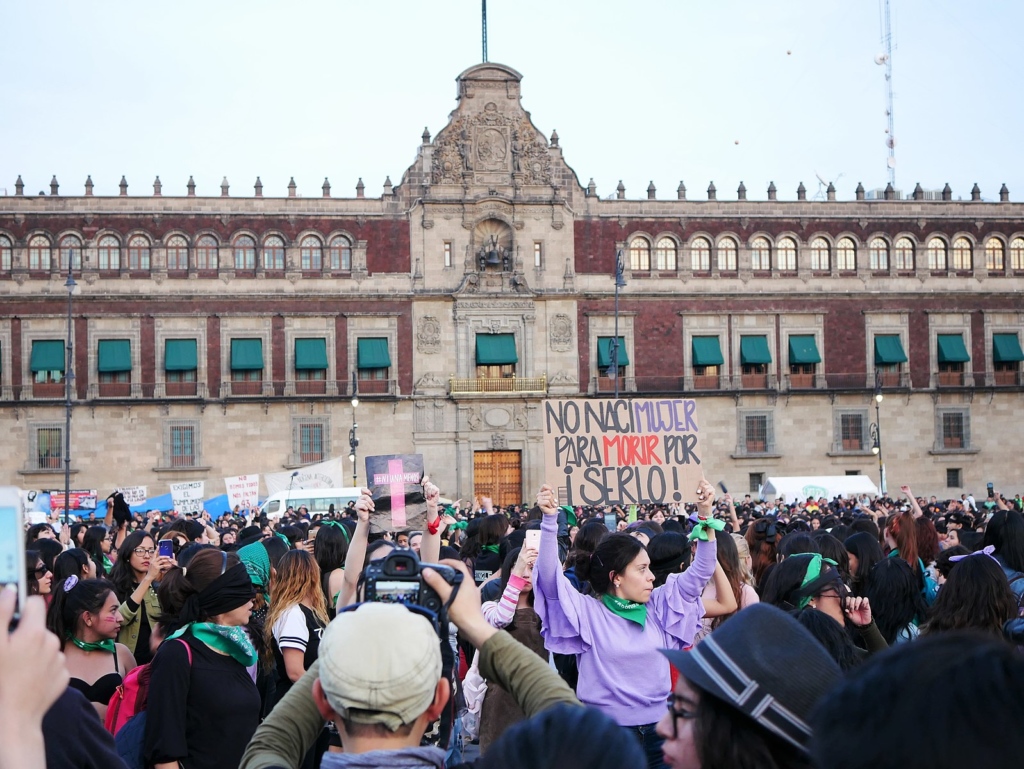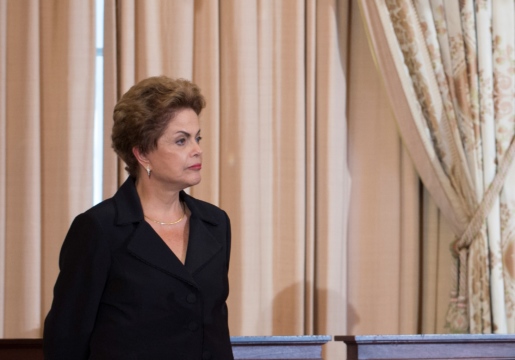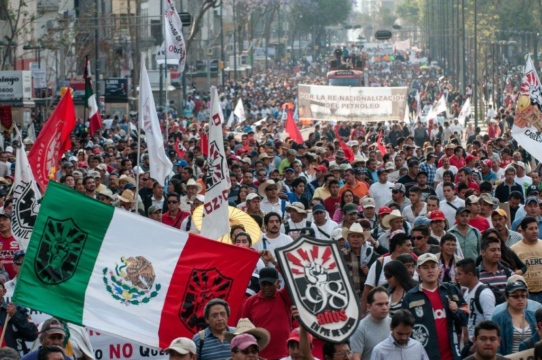
On the China-Mexico Rail Deal
What does the failed China-Mexico rail deal mean for bilateral relations?
In his September 2019 State of the Union Address, Mexican President Andrés Manuel López Obrador (AMLO) declared, “If you ask me to express in one sentence what the new government’s plan is all about: end corruption and impunity.” But well into the second year of his term, AMLO and his administration have done little to address the impunity crisis in Mexico, a country where about 98 percent of crimes committed remained unsolved. While AMLO deserves credit for pledging to combat Mexico’s impunity crisis, he has failed to set a clear strategy to address the faults and lack of independence within the justice system, calling into question his commitment to confront the root causes of impunity.
AMLO’s first full year in office, 2019, proved to be the most violent year on record in Mexico, with 34,582 murders. The same year saw an 89 percent impunity rate for intentional homicide in Mexico. In addition, in the last year femicides have taken center-stage as a pervasive issue in Mexico, prompting mass protests. About 74 percent of Mexicans believe that violence against women has increased in the past year, and more than half say it’s due to the impunity issue. Mexicanos Contra la Corrupción y la Impunidad (MCCI) and CONNECTAS reported that from 2012 to 2018, there were 3,056 reported femicides, with only 24 percent resulting in persecution. Women’s rights groups claim the reported numbers are much lower than the real figure for femicides, meaning impunity and violence against women is likely worse than the data shows.
Despite AMLO’s bold promise to end impunity, his approach to the justice system has proven poorly conceived and often counterproductive. A judicial reform plan, initially supported by AMLO, was proposed to the Senate by Attorney General Alejandro Gertz Manero in January. However, the Attorney General declined to consult Mexican civil society and proposed a plan that, if implemented, would have caused major setbacks to human rights protections. Human Rights Watch and other civil society organizations said the plan would increase the likelihood of police and prosecutorial abuses and impede judicial independence. If approved, the reform would have allowed detention of suspects for up to 40 days without charges, permitted the use in some cases of illegally obtained evidence, and decreased the number of judges who monitor defendants’ rights.

In February, AMLO withdrew his support for Gertz Manero’s regressive justice reform plan, and backed a new proposal by the president of the Supreme Court, Arturo Zaldívar. This plan seeks to fight corruption and nepotism, strengthen public defenders, and encourage gender parity. Zaldívar’s proposal would increase the number of women judges to promote gender equality in the judiciary and build up the Federal Judicial Council that oversees judges and magistrates. Strengthening the powers of the Judicial Council to combat corruption and nepotism is a step forward, especially compared to Gertz Manero’s proposal. However, promoting women judges to answer for the lack of gender perspective in rulings on femicide cases, while important, does not effectively tackle the root issue for prosecuting femicides in the justice system. Rather, the absence of special protocols to investigate crimes as femicides leads to its under-reporting and low level of prosecution. Additionally, AMLO recently dismissed 26,000 calls in March to emergency hotlines reporting violence against women as no more than prank calls. His denial of gender-based violence will make it harder for claims to be taken seriously and continue to exacerbate the systemic issues obstructing the prosecution of femicides.
Zaldívar’s plan attempts to reinforce the professionalism of the Judiciary, yet it largely fails to address the justice system’s lack of independence that hampers Mexico’s ability to combat impunity. Officials within the justice system have also proven vulnerable to influence by organized crime, undermining their ability to make autonomous decisions and follow through with independent investigations. AMLO’s support for Zaldívar’s plan improves upon oversights in Gertz Manero’s plan, but does not make significant or sustained improvements to judicial independence.
Even outside of the proposed judicial reform plans, the President has shown a lack of concern for implementing measures to increase the independence and accountability of the criminal justice system. In December 2018, Mexico passed a Ley Orgánica de la Fiscalía General de la República (LOFGR) that included a number of important reforms to the office of the chief prosecutor, such as the establishment of the Citizen Council (Consejo Ciudadano), the issuance of specialized prosecutors for human rights, electoral crimes, internal affairs, and anti-corruption, and the requirement for the Attorney General to present a Criminal Prosecution Policy (Plan de Persecución Penal). LOFGR’s reforms were created to specifically address the issue of judicial independence, and AMLO’s failure to push the Attorney General and the Senate to implement the accountability mechanisms established in the LOFGR undercuts any attempt to form an autonomous federal prosecutor’s office to combat impunity.
AMLO so far seems to prioritize his messaging for institutional change more than actually doing the challenging and crucial work of strengthening the justice system to tackle the impunity crisis.
Moreover, AMLO allowed the selection and appointment process for the Attorney General and specialized prosecutors to move forward with extreme expediency, further compromising the Fiscalía’s independence. The process to appoint the Attorney General lacked transparency and did not include citizen participation, disregarding the requirements for the procedure established in the LOFGR. The LOFGR’s requirements are strategically designed to attract and select strong candidates. Since each candidate was not thoroughly considered in accordance to the requirements, the integrity and capability of the Fiscalía to function independently is undermined.
Gertz Manero’s process to appoint specialized prosecutors was also questionable. He did not openly call for applications for the Human Rights and Anti-Corruption Special Prosecutor positions as required by the LOFGR and failed to include citizen participation. Instead, Gertz Manero quickly nominated AMLO’s top choice for the Anti-Corruption Special Prosecutor position and even failed to submit the candidate for the Human Rights Special Prosecutor position for Senate approval. The pattern of politically-motivated appointments and the lack of procedural transparency brings into question the impartiality and effectiveness of the Fiscalía and specialized prosecutors to conduct independent investigations and prosecutions, and hurts efforts to fight impunity. AMLO’s decision to allow the Senate and the Attorney General to directly contradict the LOFGR and Article 102 of the Constitution, renders him negligent in holding the Fiscalía accountable and strengthening the independence of the system, fundamental in the fight against impunity.
Gertz Manero has remained silent about whether he will put forward a new package to reform the judicial system. Furthermore, there has been some opposition to Zaldívar’s proposal from Senators, such as Ricardo Monreal, who believe the plan is not ambitious enough in reestablishing national confidence in the judicial system. In any case, further consideration of the proposals will have to wait until Congress is back in session on September 1, unless they call for an extraordinary session specifically pertaining to the judicial reform. In the meantime, the judiciary has been partially suspended in 27 of the 32 states as a measure to control the spread of Covid-19, a potential further blow to efforts to strengthen the rule of law.
[AMLO] has consistently contradicted his message by supporting regressive and weak reform plans, failing to strengthen the independence of the judiciary, and allowing the Fiscalía to continue its work without accountability or transparency.
AMLO so far seems to prioritize his messaging for institutional change more than actually doing the challenging and crucial work of strengthening the justice system to tackle the impunity crisis. He has consistently contradicted his message by supporting regressive and weak reform plans, failing to strengthen the independence of the judiciary, and allowing the Fiscalía to continue its work without accountability or transparency. Nonetheless, the President still has the opportunity to move forward and make good on his campaign pledges. A meaningful plan to tackle impunity should include the following steps to strengthen the professionalism and independence of Mexico’s investigators, prosecutors, and judges. These recommendations are reflective of the active efforts made by Mexican civil society and international organizations to push for the enforcement of LOFGR and ultimately strengthen the fight against impunity.
1. Enforce provisions of the LOFGR that have not been implemented. In order for the Fiscalía to be considered legitimate and impartial, it must implement a meaningful Criminal Prosecution Policy (Plan de Persecución Penal), and include citizen and civil society participation. The Plan de Persecución Penal outlines the Fiscalía’s priorities and strategies to combat crime in Mexico and gives citizens the ability to oversee the Fiscalía’s actions in accordance to the plan. As of May 29, Gertz Manero is yet to construct and present a legitimate plan to the Senate in accordance to the LOFGR. Implementing the Consejo Ciudadano required by the LOFGR is equally as critical to ensure the Fiscalía’s independence. The Consejo Ciudadano ensures citizen participation, advises the Prosecutor General on the creation of policies such as the Plan de Persecución Penal, and serves as an oversight mechanism to hold the office of the Prosecutor General accountable. As of May 29, a Consejo Ciudadano has still not been appointed by the Senate.
2. Proactively address the judicial system’s lack of judges that poses a challenge to due process and increases the chances of impunity. Reducing the number of judges that monitor for police and prosecutor abuse and who review pre-trial evidence for permissibility would exacerbate the crisis. According to the 2017 Global Impunity Index (GII-2017), Mexico has 4.2 judges per 100,000 people, which is below the global average of 16.23 per 100,000. To put it in perspective, Croatia, which has the lowest levels of impunity according to the GII-2017, has 45 judges per 100,000 people. Increasing their numbers may reduce sentencing times, which could help decrease the chances of violations against detainees’ civil rights to occur.
3. Develop a strategy to address inadequate police investigations and flawed and insufficient work done by prosecutors, both of which contribute to the dysfunctionality of the justice system. To improve the capacity of law enforcement personnel and prosecutors at the local, state, and federal level, the administration should implement specialized training on using victims’ history to correctly classify and analyze crimes. Gaining expertise in properly classifying femicides and crimes against journalists as such will help in obtaining convincing evidence against the perpetrator and getting a conviction.
Carole Botello is a recent graduate from the University of Maryland with a degree in communications-public relations and a minor in international development and conflict management. She was an intern with the Peter D. Bell Rule of Law Program.
What does the failed China-Mexico rail deal mean for bilateral relations?
Brazil’s debilitating problems seem to be of far greater interest than its spectacular rise just a few years ago.
2018 will be a pivotal year for energy in Latin America, as the region’s top oil producers are set to hold presidential elections that could lead to sweeping policy changes.

